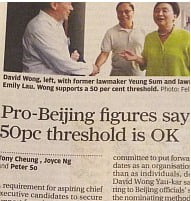The anguish draws nearer. Hong Kong establishment figures drop hints that the Chinese government will implement a ‘conservative’ nomination system for the 2017 Chief Executive election. Specifically, candidates will likely have to be endorsed by over 50% of Nomination Committee members to get on the ballot. Pro-democrats demand a far lower threshold, if not an open, public system of nomination.
 No Hong Kong public figures know Beijing’s specific plans. It could be that this is about expectations management, and the political reform package due in a few weeks’ time will be more liberal than this, and everyone will be deliriously happy and dance in the streets with joy. But anyone who has been watching this drawn-out drama over the years will feel that the ‘50% threshold’ rings true and unsurprising.
No Hong Kong public figures know Beijing’s specific plans. It could be that this is about expectations management, and the political reform package due in a few weeks’ time will be more liberal than this, and everyone will be deliriously happy and dance in the streets with joy. But anyone who has been watching this drawn-out drama over the years will feel that the ‘50% threshold’ rings true and unsurprising.
Pro-democrats are going to react bitterly (and, on cue, the regulators advise banks to prepare for Occupy Central demonstrators to swamp the streets). To them, the range of possible nomination systems are a spectrum, and the ‘50%’ method is at the extreme illiberal end of it.
But there is no spectrum. There are simply two possible states: Communist Party control, and an absence of Communist Party control.
Pro-democrats will rage against the unrepresentative nature of the Nomination Committee. They will angrily protest that only 1,200 people (possibly more, but the number’s irrelevant) will get to pick the candidates. They want a much broader committee, including far more popularly elected representatives. Again, they see different approaches to the composition of the nominating body as a spectrum, ranging from pure white (the whole electorate) through shades of grey to pitch black (1,200 mostly pro-Beijing stooges).
Again, they are miles away from the reality. There is only black and white: Communist Party control, and no Communist Party control.
Chinese and Hong Kong officials encourage the impression that multiple degrees of democratic-ness have potentially been on offer here. They will argue that, while we might wish otherwise, the ‘50%’ threshold at the far end of the spectrum is necessary because of national security and the Basic Law. The 1,200-stooges Nomination Committee is required, they will say, because of sectors and some sort of balance of representation.
The pro-democrats will take it at face value (as will the surprisingly gullible international press). They will act oblivious to the fact that the 50%/1,200-stooges model is – like today’s Election Committee – a pure rubber stamp for decisions made beforehand at the top in Beijing, and the fact that a one-party system can accommodate nothing else. (Take it as written: Beijing will draw up the list, and the secure majority bloc on the Nomination Committee will ‘nominate’ it. Don’t listen to stuff about how ‘elites’ will choose the candidates; they will be ornaments only.)
There were only ever two ways Hong Kong could have some sort of universal suffrage: one that is compatible with one-party rule, and one which is not compatible with one-party rule, Make that one way.
It has been a case of the ‘pretending to be blind’ leading the blind. Chinese government officials probably see this extended and often mind-numbing charade as a great success. They have kept Hong Kong’s pro-democrats preoccupied – for years – squabbling over unattainable and irrelevant details about structures and procedures like thresholds and nomination committees, or who counts as patriotic. They probably feel they are crushing an enemy. But they created it in the first place by failing to deliver competent government in Hong Kong.
What happens next? By rights, the pro-democrats should by now have been irreversibly split and neutralized as a popular force. Instead, Beijing recently orchestrated a campaign of bullying, smears and attacks that probably made them more united and certainly attracted unexpected levels of public support. Theirs is the Kingdom of Heaven, and they can fantasize that constitutional law will come, like the cavalry, riding to the rescue. But the sad fact is that the 2017 electoral arrangements were almost certainly decided long ago and were never up for negotiation.
Officials are muttering that failure to get reform through in 2017 means there could be no change until 2027. That’s the sort of claim that will probably bring public opinion around to Chief Secretary Carrie Lam’s plea to ‘pocket it first’ – it’s better than nothing. What she can’t say, and no-one is saying, is that to the Communist Party this is a big and frightening step: a quasi-democracy in which it decides ‘only’ the ballot and lets the people make the final decision. We don’t know what difference it will make to governance, but it is interesting to note the lack of enthusiasm for such reform among the tycoon-bureaucrat caste that has run everything so far. If it’s any consolation to pro-democrats, we wouldn’t even be getting this had it not been for years of demonstrations, complaints, demands and sheer obstinacy.

Millions who suffer from a phobia about Teletubbies are condemned to months of nightmares as the South China Morning Post publishes an image of what must be the scariest, creepiest child-creatures ever, right here in Hong Kong.
